McDonald's in Poland: A Case Study on Leadership and Management Styles
VerifiedAdded on 2023/06/11
|12
|2805
|103
Case Study
AI Summary
This case study examines McDonald's successful entry and operation in Poland, focusing on leadership and management approaches within a global context. It identifies three levels of organizational responsibilities: top, middle, and operative management, and discusses functional and divisional organizational structures. The analysis suggests that McDonald's employs a transactional leadership style, rewarding performance and fostering long-term relationships with suppliers. The study also explores the effects of globalization, using the PESTEL model, and reviews McDonald's CSR initiatives, particularly its collaboration with local farmers and the Green Factory. Recommendations include reducing waste and using upgraded vehicles for McDelivery to lower CO2 emissions. The case concludes that McDonald's innovative strategies, risk-taking leadership, and focus on globalization and CSR have driven its success in Poland.
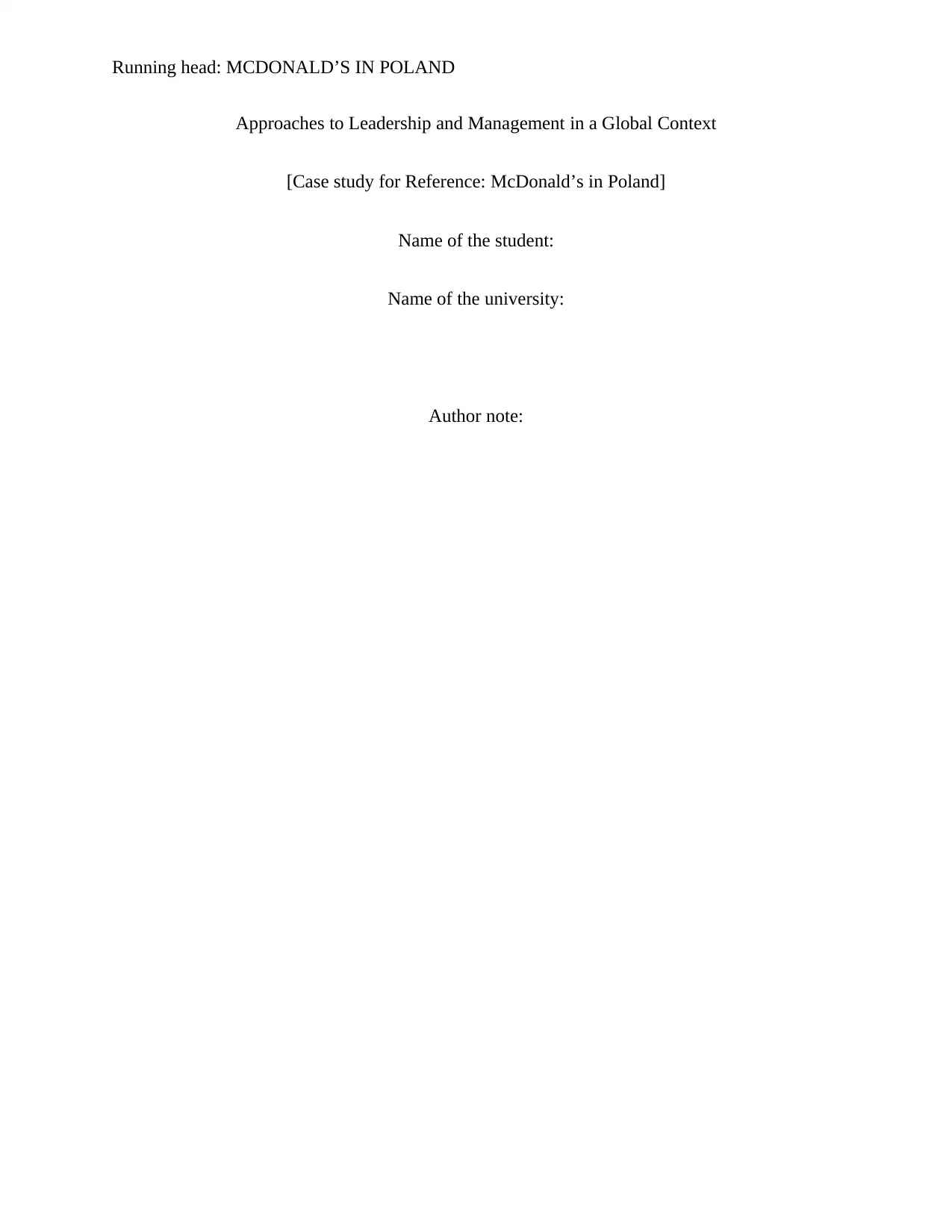
Running head: MCDONALD’S IN POLAND
Approaches to Leadership and Management in a Global Context
[Case study for Reference: McDonald’s in Poland]
Name of the student:
Name of the university:
Author note:
Approaches to Leadership and Management in a Global Context
[Case study for Reference: McDonald’s in Poland]
Name of the student:
Name of the university:
Author note:
Paraphrase This Document
Need a fresh take? Get an instant paraphrase of this document with our AI Paraphraser
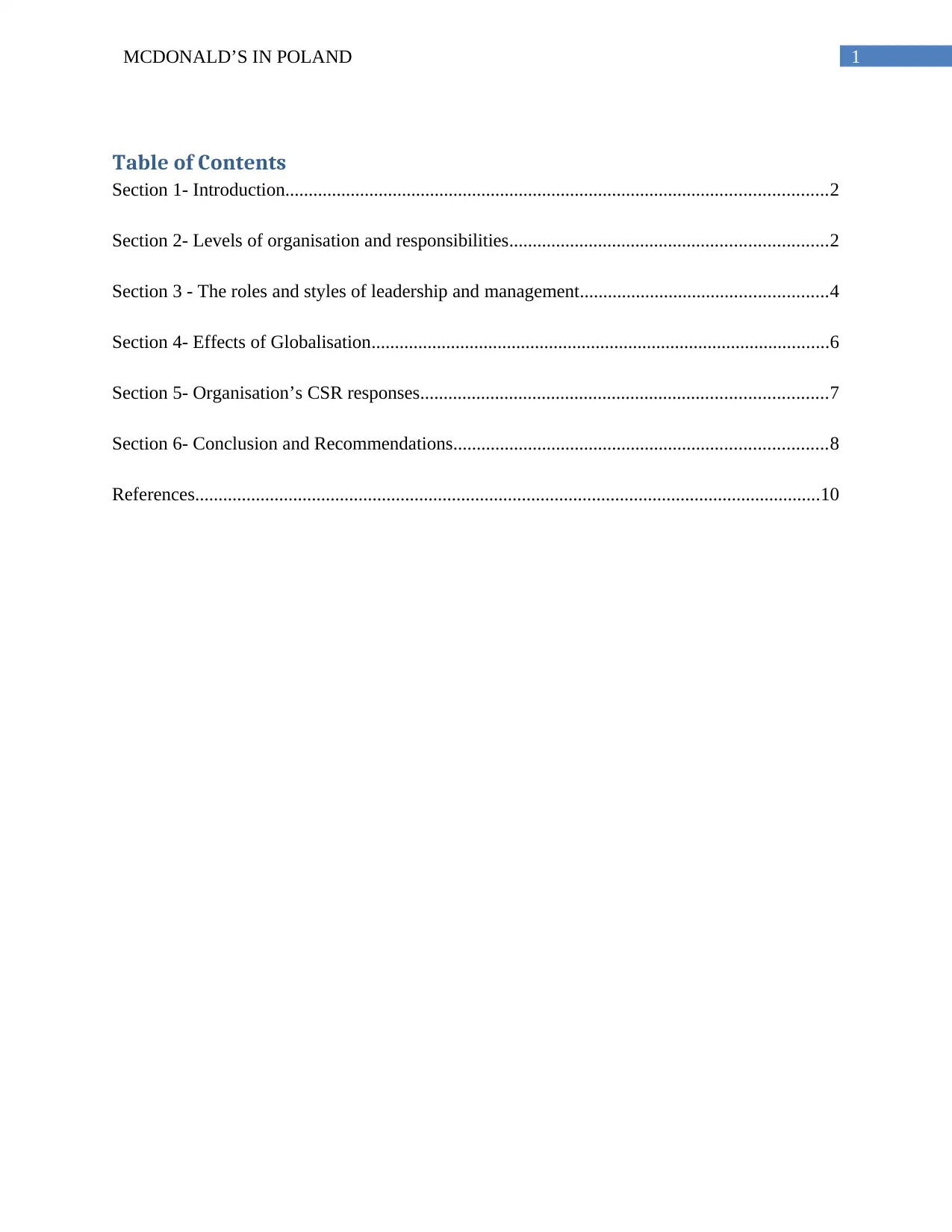
1MCDONALD’S IN POLAND
Table of Contents
Section 1- Introduction....................................................................................................................2
Section 2- Levels of organisation and responsibilities....................................................................2
Section 3 - The roles and styles of leadership and management.....................................................4
Section 4- Effects of Globalisation..................................................................................................6
Section 5- Organisation’s CSR responses.......................................................................................7
Section 6- Conclusion and Recommendations................................................................................8
References......................................................................................................................................10
Table of Contents
Section 1- Introduction....................................................................................................................2
Section 2- Levels of organisation and responsibilities....................................................................2
Section 3 - The roles and styles of leadership and management.....................................................4
Section 4- Effects of Globalisation..................................................................................................6
Section 5- Organisation’s CSR responses.......................................................................................7
Section 6- Conclusion and Recommendations................................................................................8
References......................................................................................................................................10
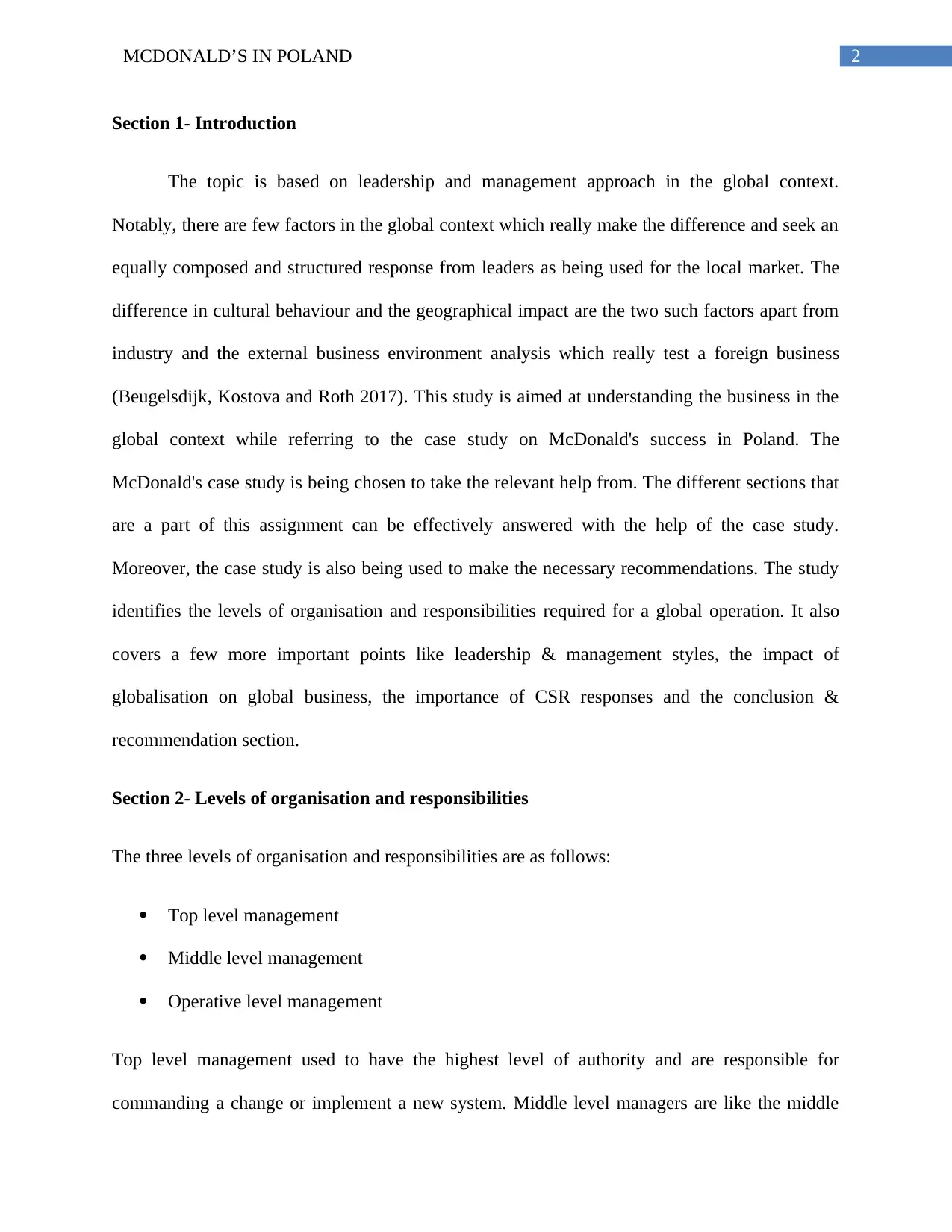
2MCDONALD’S IN POLAND
Section 1- Introduction
The topic is based on leadership and management approach in the global context.
Notably, there are few factors in the global context which really make the difference and seek an
equally composed and structured response from leaders as being used for the local market. The
difference in cultural behaviour and the geographical impact are the two such factors apart from
industry and the external business environment analysis which really test a foreign business
(Beugelsdijk, Kostova and Roth 2017). This study is aimed at understanding the business in the
global context while referring to the case study on McDonald's success in Poland. The
McDonald's case study is being chosen to take the relevant help from. The different sections that
are a part of this assignment can be effectively answered with the help of the case study.
Moreover, the case study is also being used to make the necessary recommendations. The study
identifies the levels of organisation and responsibilities required for a global operation. It also
covers a few more important points like leadership & management styles, the impact of
globalisation on global business, the importance of CSR responses and the conclusion &
recommendation section.
Section 2- Levels of organisation and responsibilities
The three levels of organisation and responsibilities are as follows:
Top level management
Middle level management
Operative level management
Top level management used to have the highest level of authority and are responsible for
commanding a change or implement a new system. Middle level managers are like the middle
Section 1- Introduction
The topic is based on leadership and management approach in the global context.
Notably, there are few factors in the global context which really make the difference and seek an
equally composed and structured response from leaders as being used for the local market. The
difference in cultural behaviour and the geographical impact are the two such factors apart from
industry and the external business environment analysis which really test a foreign business
(Beugelsdijk, Kostova and Roth 2017). This study is aimed at understanding the business in the
global context while referring to the case study on McDonald's success in Poland. The
McDonald's case study is being chosen to take the relevant help from. The different sections that
are a part of this assignment can be effectively answered with the help of the case study.
Moreover, the case study is also being used to make the necessary recommendations. The study
identifies the levels of organisation and responsibilities required for a global operation. It also
covers a few more important points like leadership & management styles, the impact of
globalisation on global business, the importance of CSR responses and the conclusion &
recommendation section.
Section 2- Levels of organisation and responsibilities
The three levels of organisation and responsibilities are as follows:
Top level management
Middle level management
Operative level management
Top level management used to have the highest level of authority and are responsible for
commanding a change or implement a new system. Middle level managers are like the middle
⊘ This is a preview!⊘
Do you want full access?
Subscribe today to unlock all pages.

Trusted by 1+ million students worldwide
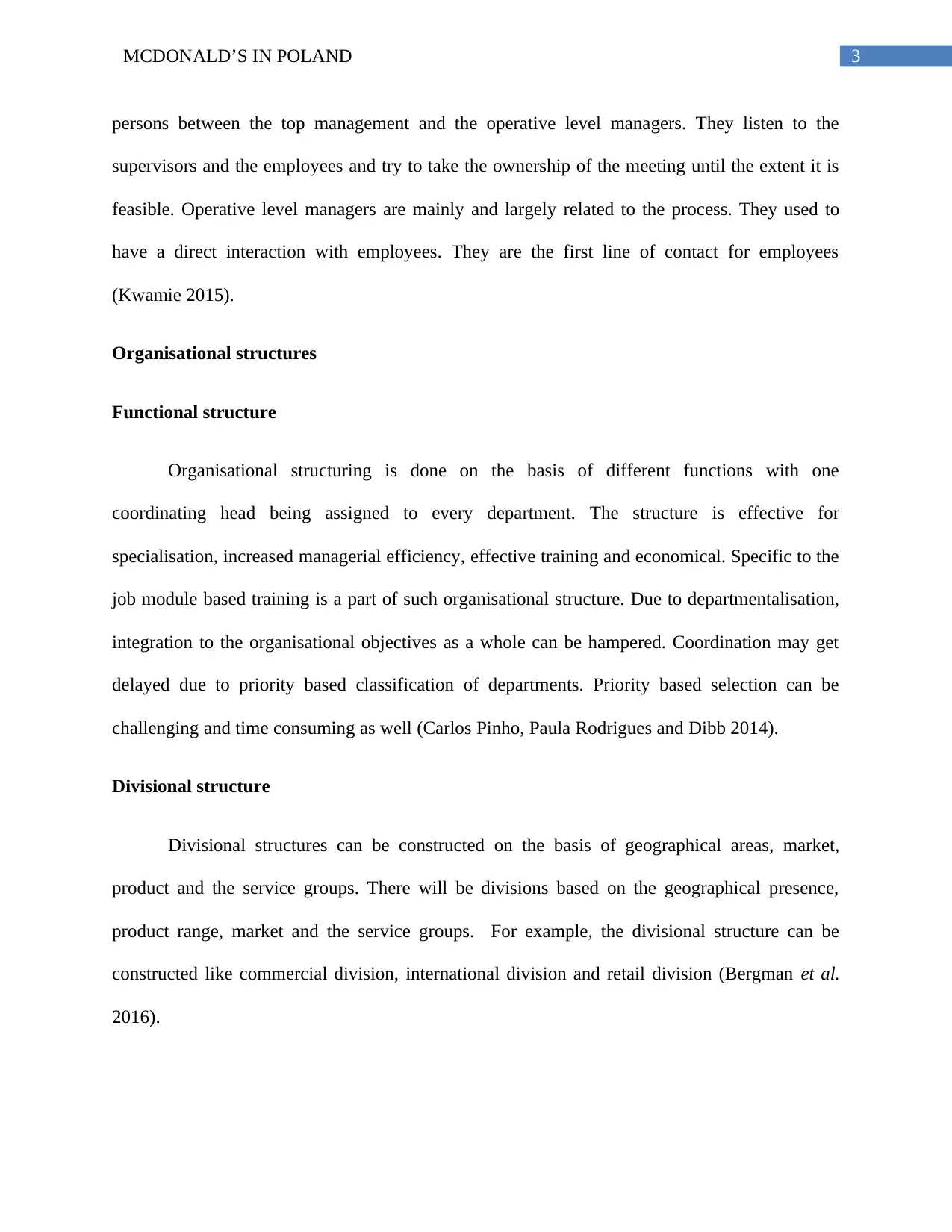
3MCDONALD’S IN POLAND
persons between the top management and the operative level managers. They listen to the
supervisors and the employees and try to take the ownership of the meeting until the extent it is
feasible. Operative level managers are mainly and largely related to the process. They used to
have a direct interaction with employees. They are the first line of contact for employees
(Kwamie 2015).
Organisational structures
Functional structure
Organisational structuring is done on the basis of different functions with one
coordinating head being assigned to every department. The structure is effective for
specialisation, increased managerial efficiency, effective training and economical. Specific to the
job module based training is a part of such organisational structure. Due to departmentalisation,
integration to the organisational objectives as a whole can be hampered. Coordination may get
delayed due to priority based classification of departments. Priority based selection can be
challenging and time consuming as well (Carlos Pinho, Paula Rodrigues and Dibb 2014).
Divisional structure
Divisional structures can be constructed on the basis of geographical areas, market,
product and the service groups. There will be divisions based on the geographical presence,
product range, market and the service groups. For example, the divisional structure can be
constructed like commercial division, international division and retail division (Bergman et al.
2016).
persons between the top management and the operative level managers. They listen to the
supervisors and the employees and try to take the ownership of the meeting until the extent it is
feasible. Operative level managers are mainly and largely related to the process. They used to
have a direct interaction with employees. They are the first line of contact for employees
(Kwamie 2015).
Organisational structures
Functional structure
Organisational structuring is done on the basis of different functions with one
coordinating head being assigned to every department. The structure is effective for
specialisation, increased managerial efficiency, effective training and economical. Specific to the
job module based training is a part of such organisational structure. Due to departmentalisation,
integration to the organisational objectives as a whole can be hampered. Coordination may get
delayed due to priority based classification of departments. Priority based selection can be
challenging and time consuming as well (Carlos Pinho, Paula Rodrigues and Dibb 2014).
Divisional structure
Divisional structures can be constructed on the basis of geographical areas, market,
product and the service groups. There will be divisions based on the geographical presence,
product range, market and the service groups. For example, the divisional structure can be
constructed like commercial division, international division and retail division (Bergman et al.
2016).
Paraphrase This Document
Need a fresh take? Get an instant paraphrase of this document with our AI Paraphraser
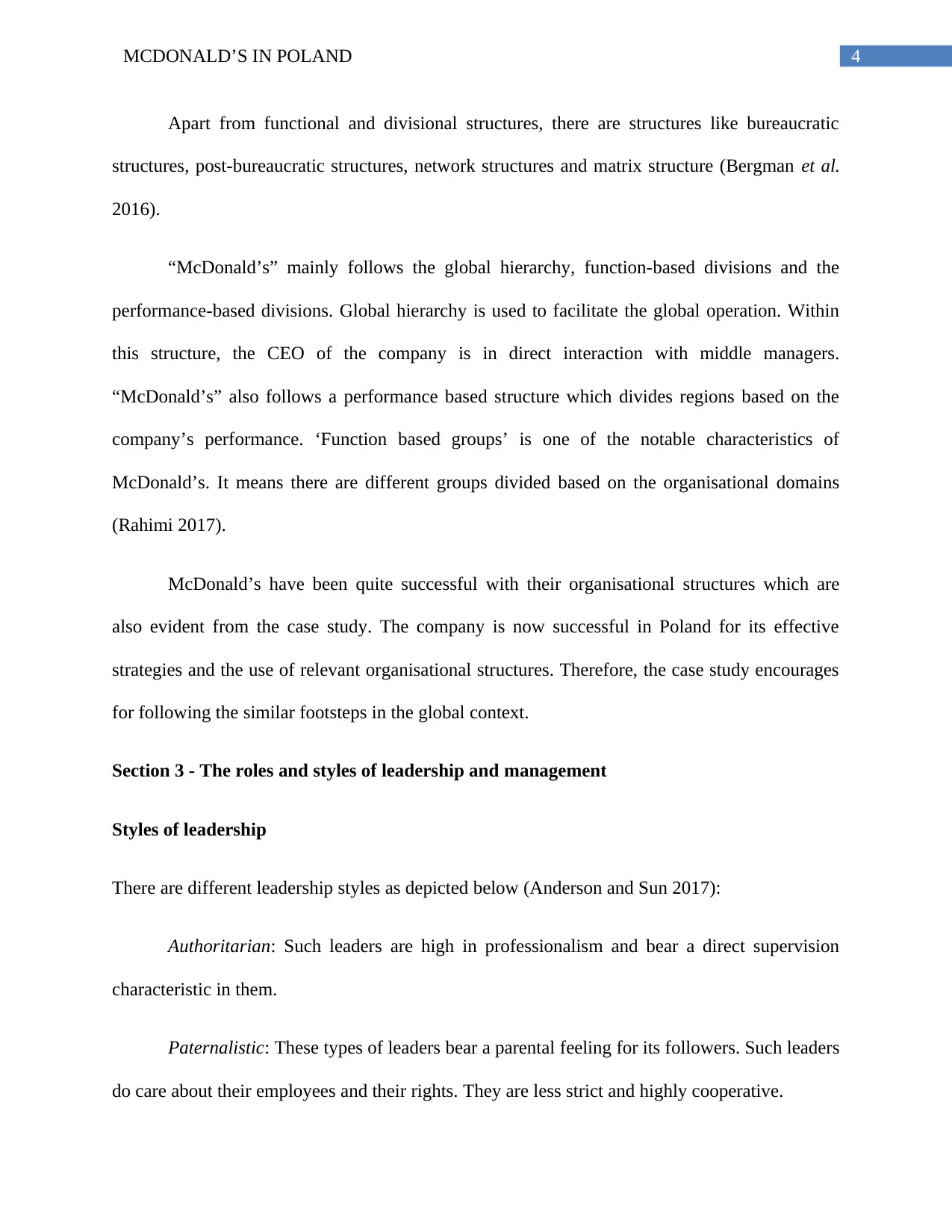
4MCDONALD’S IN POLAND
Apart from functional and divisional structures, there are structures like bureaucratic
structures, post-bureaucratic structures, network structures and matrix structure (Bergman et al.
2016).
“McDonald’s” mainly follows the global hierarchy, function-based divisions and the
performance-based divisions. Global hierarchy is used to facilitate the global operation. Within
this structure, the CEO of the company is in direct interaction with middle managers.
“McDonald’s” also follows a performance based structure which divides regions based on the
company’s performance. ‘Function based groups’ is one of the notable characteristics of
McDonald’s. It means there are different groups divided based on the organisational domains
(Rahimi 2017).
McDonald’s have been quite successful with their organisational structures which are
also evident from the case study. The company is now successful in Poland for its effective
strategies and the use of relevant organisational structures. Therefore, the case study encourages
for following the similar footsteps in the global context.
Section 3 - The roles and styles of leadership and management
Styles of leadership
There are different leadership styles as depicted below (Anderson and Sun 2017):
Authoritarian: Such leaders are high in professionalism and bear a direct supervision
characteristic in them.
Paternalistic: These types of leaders bear a parental feeling for its followers. Such leaders
do care about their employees and their rights. They are less strict and highly cooperative.
Apart from functional and divisional structures, there are structures like bureaucratic
structures, post-bureaucratic structures, network structures and matrix structure (Bergman et al.
2016).
“McDonald’s” mainly follows the global hierarchy, function-based divisions and the
performance-based divisions. Global hierarchy is used to facilitate the global operation. Within
this structure, the CEO of the company is in direct interaction with middle managers.
“McDonald’s” also follows a performance based structure which divides regions based on the
company’s performance. ‘Function based groups’ is one of the notable characteristics of
McDonald’s. It means there are different groups divided based on the organisational domains
(Rahimi 2017).
McDonald’s have been quite successful with their organisational structures which are
also evident from the case study. The company is now successful in Poland for its effective
strategies and the use of relevant organisational structures. Therefore, the case study encourages
for following the similar footsteps in the global context.
Section 3 - The roles and styles of leadership and management
Styles of leadership
There are different leadership styles as depicted below (Anderson and Sun 2017):
Authoritarian: Such leaders are high in professionalism and bear a direct supervision
characteristic in them.
Paternalistic: These types of leaders bear a parental feeling for its followers. Such leaders
do care about their employees and their rights. They are less strict and highly cooperative.
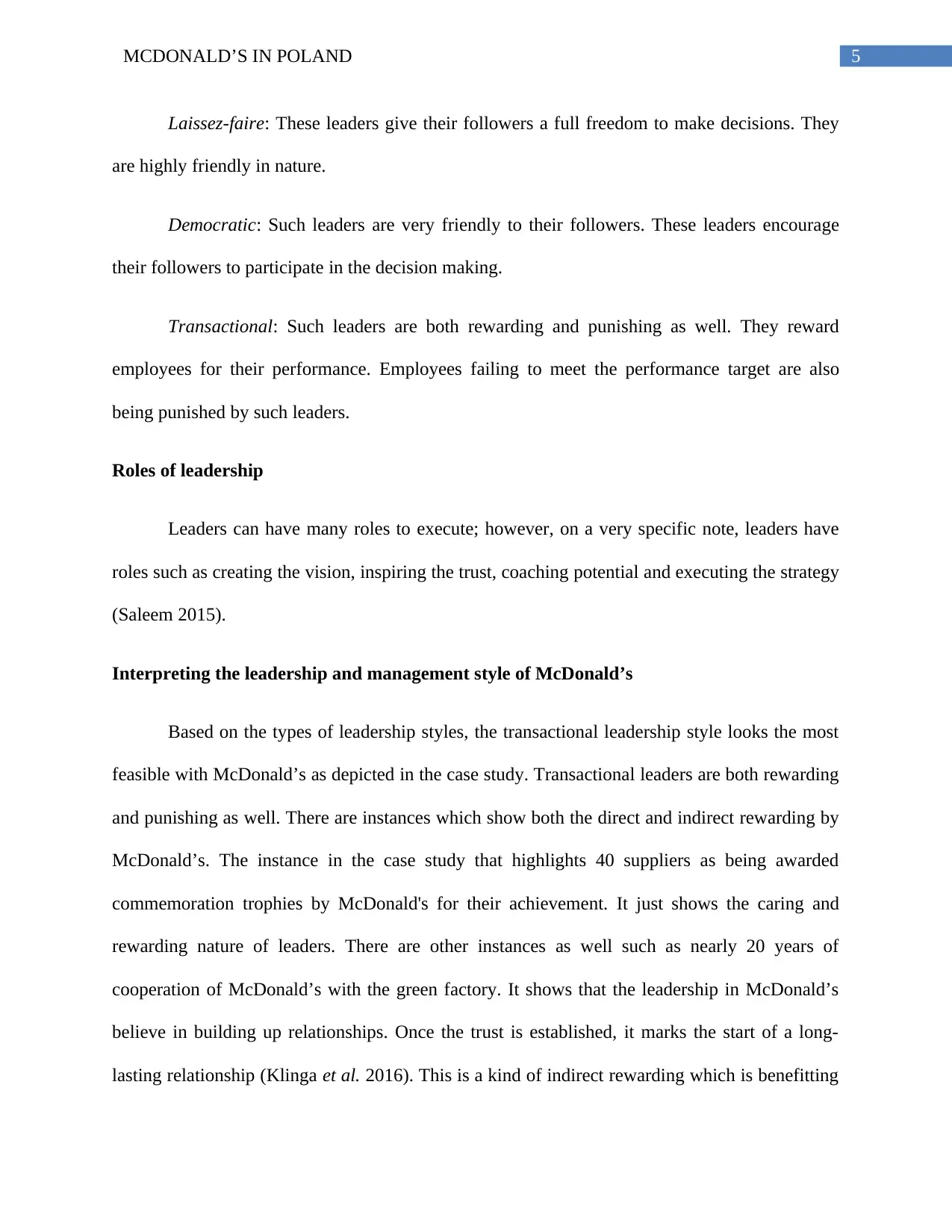
5MCDONALD’S IN POLAND
Laissez-faire: These leaders give their followers a full freedom to make decisions. They
are highly friendly in nature.
Democratic: Such leaders are very friendly to their followers. These leaders encourage
their followers to participate in the decision making.
Transactional: Such leaders are both rewarding and punishing as well. They reward
employees for their performance. Employees failing to meet the performance target are also
being punished by such leaders.
Roles of leadership
Leaders can have many roles to execute; however, on a very specific note, leaders have
roles such as creating the vision, inspiring the trust, coaching potential and executing the strategy
(Saleem 2015).
Interpreting the leadership and management style of McDonald’s
Based on the types of leadership styles, the transactional leadership style looks the most
feasible with McDonald’s as depicted in the case study. Transactional leaders are both rewarding
and punishing as well. There are instances which show both the direct and indirect rewarding by
McDonald’s. The instance in the case study that highlights 40 suppliers as being awarded
commemoration trophies by McDonald's for their achievement. It just shows the caring and
rewarding nature of leaders. There are other instances as well such as nearly 20 years of
cooperation of McDonald’s with the green factory. It shows that the leadership in McDonald’s
believe in building up relationships. Once the trust is established, it marks the start of a long-
lasting relationship (Klinga et al. 2016). This is a kind of indirect rewarding which is benefitting
Laissez-faire: These leaders give their followers a full freedom to make decisions. They
are highly friendly in nature.
Democratic: Such leaders are very friendly to their followers. These leaders encourage
their followers to participate in the decision making.
Transactional: Such leaders are both rewarding and punishing as well. They reward
employees for their performance. Employees failing to meet the performance target are also
being punished by such leaders.
Roles of leadership
Leaders can have many roles to execute; however, on a very specific note, leaders have
roles such as creating the vision, inspiring the trust, coaching potential and executing the strategy
(Saleem 2015).
Interpreting the leadership and management style of McDonald’s
Based on the types of leadership styles, the transactional leadership style looks the most
feasible with McDonald’s as depicted in the case study. Transactional leaders are both rewarding
and punishing as well. There are instances which show both the direct and indirect rewarding by
McDonald’s. The instance in the case study that highlights 40 suppliers as being awarded
commemoration trophies by McDonald's for their achievement. It just shows the caring and
rewarding nature of leaders. There are other instances as well such as nearly 20 years of
cooperation of McDonald’s with the green factory. It shows that the leadership in McDonald’s
believe in building up relationships. Once the trust is established, it marks the start of a long-
lasting relationship (Klinga et al. 2016). This is a kind of indirect rewarding which is benefitting
⊘ This is a preview!⊘
Do you want full access?
Subscribe today to unlock all pages.

Trusted by 1+ million students worldwide
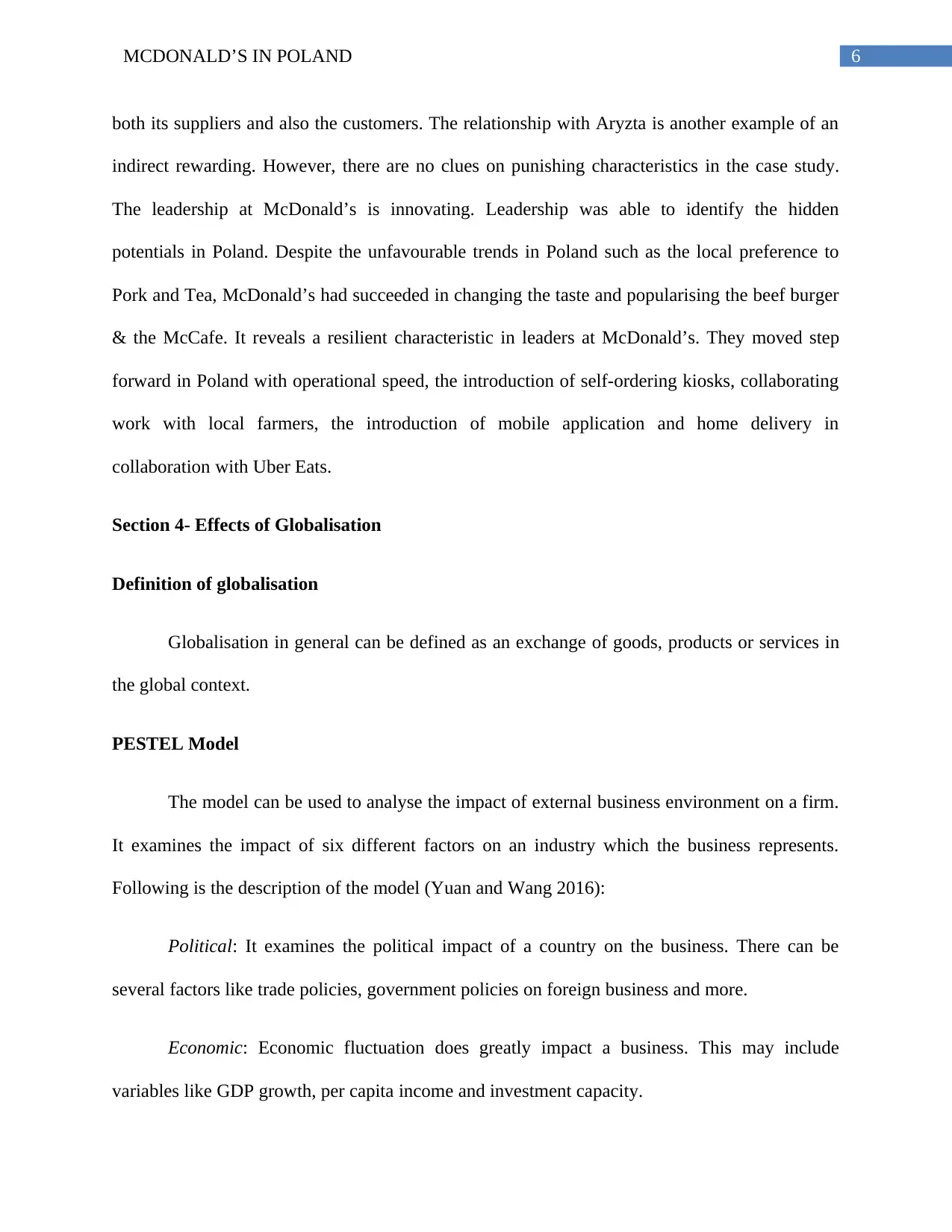
6MCDONALD’S IN POLAND
both its suppliers and also the customers. The relationship with Aryzta is another example of an
indirect rewarding. However, there are no clues on punishing characteristics in the case study.
The leadership at McDonald’s is innovating. Leadership was able to identify the hidden
potentials in Poland. Despite the unfavourable trends in Poland such as the local preference to
Pork and Tea, McDonald’s had succeeded in changing the taste and popularising the beef burger
& the McCafe. It reveals a resilient characteristic in leaders at McDonald’s. They moved step
forward in Poland with operational speed, the introduction of self-ordering kiosks, collaborating
work with local farmers, the introduction of mobile application and home delivery in
collaboration with Uber Eats.
Section 4- Effects of Globalisation
Definition of globalisation
Globalisation in general can be defined as an exchange of goods, products or services in
the global context.
PESTEL Model
The model can be used to analyse the impact of external business environment on a firm.
It examines the impact of six different factors on an industry which the business represents.
Following is the description of the model (Yuan and Wang 2016):
Political: It examines the political impact of a country on the business. There can be
several factors like trade policies, government policies on foreign business and more.
Economic: Economic fluctuation does greatly impact a business. This may include
variables like GDP growth, per capita income and investment capacity.
both its suppliers and also the customers. The relationship with Aryzta is another example of an
indirect rewarding. However, there are no clues on punishing characteristics in the case study.
The leadership at McDonald’s is innovating. Leadership was able to identify the hidden
potentials in Poland. Despite the unfavourable trends in Poland such as the local preference to
Pork and Tea, McDonald’s had succeeded in changing the taste and popularising the beef burger
& the McCafe. It reveals a resilient characteristic in leaders at McDonald’s. They moved step
forward in Poland with operational speed, the introduction of self-ordering kiosks, collaborating
work with local farmers, the introduction of mobile application and home delivery in
collaboration with Uber Eats.
Section 4- Effects of Globalisation
Definition of globalisation
Globalisation in general can be defined as an exchange of goods, products or services in
the global context.
PESTEL Model
The model can be used to analyse the impact of external business environment on a firm.
It examines the impact of six different factors on an industry which the business represents.
Following is the description of the model (Yuan and Wang 2016):
Political: It examines the political impact of a country on the business. There can be
several factors like trade policies, government policies on foreign business and more.
Economic: Economic fluctuation does greatly impact a business. This may include
variables like GDP growth, per capita income and investment capacity.
Paraphrase This Document
Need a fresh take? Get an instant paraphrase of this document with our AI Paraphraser
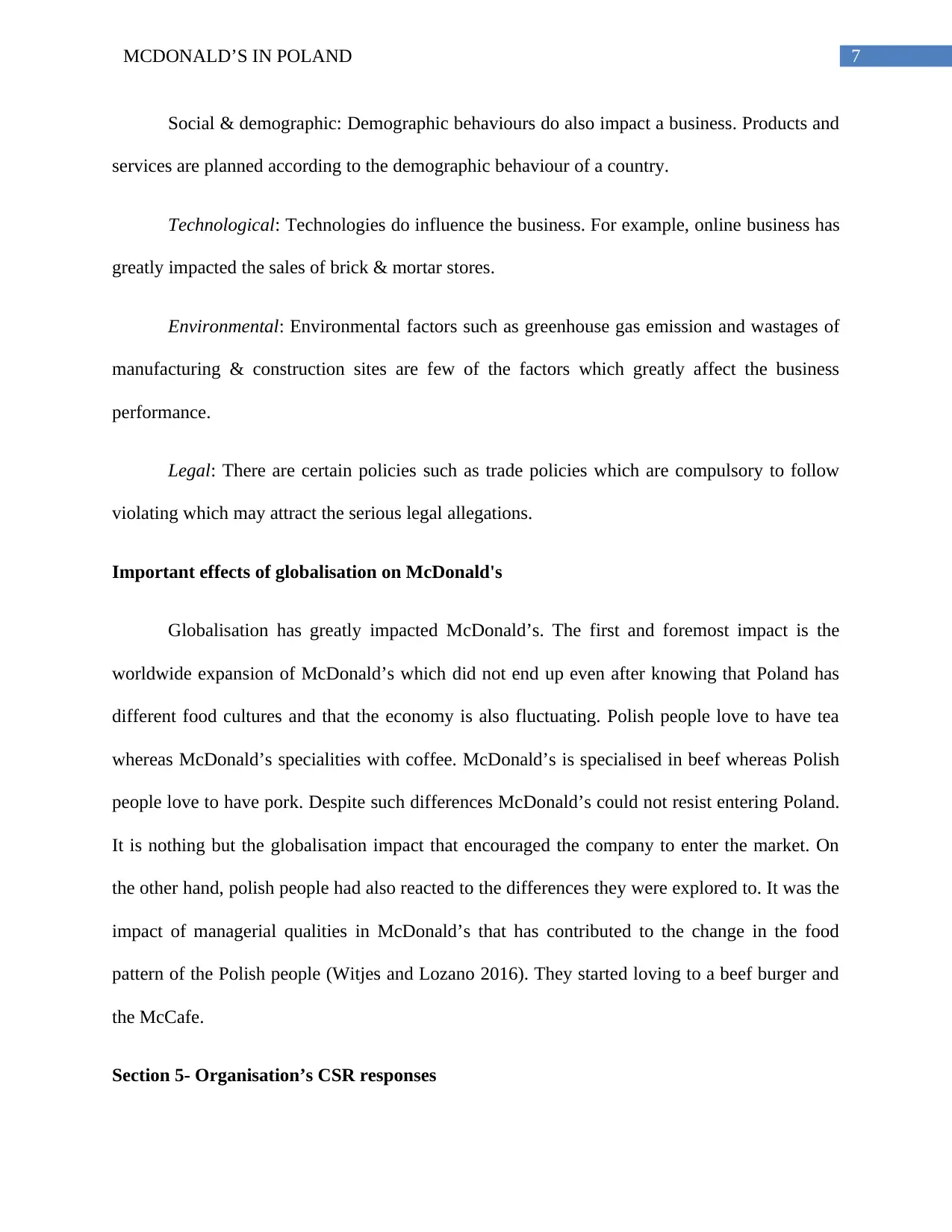
7MCDONALD’S IN POLAND
Social & demographic: Demographic behaviours do also impact a business. Products and
services are planned according to the demographic behaviour of a country.
Technological: Technologies do influence the business. For example, online business has
greatly impacted the sales of brick & mortar stores.
Environmental: Environmental factors such as greenhouse gas emission and wastages of
manufacturing & construction sites are few of the factors which greatly affect the business
performance.
Legal: There are certain policies such as trade policies which are compulsory to follow
violating which may attract the serious legal allegations.
Important effects of globalisation on McDonald's
Globalisation has greatly impacted McDonald’s. The first and foremost impact is the
worldwide expansion of McDonald’s which did not end up even after knowing that Poland has
different food cultures and that the economy is also fluctuating. Polish people love to have tea
whereas McDonald’s specialities with coffee. McDonald’s is specialised in beef whereas Polish
people love to have pork. Despite such differences McDonald’s could not resist entering Poland.
It is nothing but the globalisation impact that encouraged the company to enter the market. On
the other hand, polish people had also reacted to the differences they were explored to. It was the
impact of managerial qualities in McDonald’s that has contributed to the change in the food
pattern of the Polish people (Witjes and Lozano 2016). They started loving to a beef burger and
the McCafe.
Section 5- Organisation’s CSR responses
Social & demographic: Demographic behaviours do also impact a business. Products and
services are planned according to the demographic behaviour of a country.
Technological: Technologies do influence the business. For example, online business has
greatly impacted the sales of brick & mortar stores.
Environmental: Environmental factors such as greenhouse gas emission and wastages of
manufacturing & construction sites are few of the factors which greatly affect the business
performance.
Legal: There are certain policies such as trade policies which are compulsory to follow
violating which may attract the serious legal allegations.
Important effects of globalisation on McDonald's
Globalisation has greatly impacted McDonald’s. The first and foremost impact is the
worldwide expansion of McDonald’s which did not end up even after knowing that Poland has
different food cultures and that the economy is also fluctuating. Polish people love to have tea
whereas McDonald’s specialities with coffee. McDonald’s is specialised in beef whereas Polish
people love to have pork. Despite such differences McDonald’s could not resist entering Poland.
It is nothing but the globalisation impact that encouraged the company to enter the market. On
the other hand, polish people had also reacted to the differences they were explored to. It was the
impact of managerial qualities in McDonald’s that has contributed to the change in the food
pattern of the Polish people (Witjes and Lozano 2016). They started loving to a beef burger and
the McCafe.
Section 5- Organisation’s CSR responses
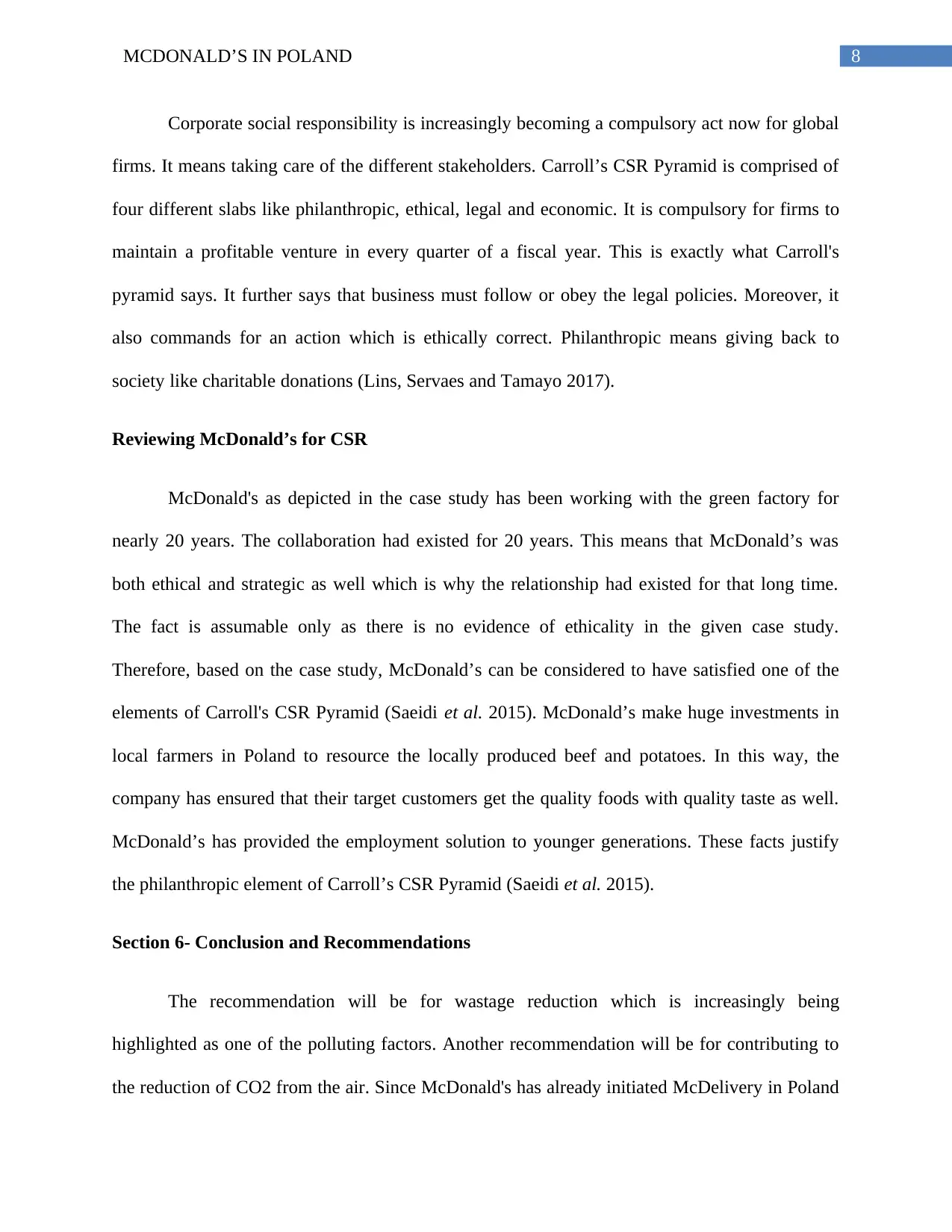
8MCDONALD’S IN POLAND
Corporate social responsibility is increasingly becoming a compulsory act now for global
firms. It means taking care of the different stakeholders. Carroll’s CSR Pyramid is comprised of
four different slabs like philanthropic, ethical, legal and economic. It is compulsory for firms to
maintain a profitable venture in every quarter of a fiscal year. This is exactly what Carroll's
pyramid says. It further says that business must follow or obey the legal policies. Moreover, it
also commands for an action which is ethically correct. Philanthropic means giving back to
society like charitable donations (Lins, Servaes and Tamayo 2017).
Reviewing McDonald’s for CSR
McDonald's as depicted in the case study has been working with the green factory for
nearly 20 years. The collaboration had existed for 20 years. This means that McDonald’s was
both ethical and strategic as well which is why the relationship had existed for that long time.
The fact is assumable only as there is no evidence of ethicality in the given case study.
Therefore, based on the case study, McDonald’s can be considered to have satisfied one of the
elements of Carroll's CSR Pyramid (Saeidi et al. 2015). McDonald’s make huge investments in
local farmers in Poland to resource the locally produced beef and potatoes. In this way, the
company has ensured that their target customers get the quality foods with quality taste as well.
McDonald’s has provided the employment solution to younger generations. These facts justify
the philanthropic element of Carroll’s CSR Pyramid (Saeidi et al. 2015).
Section 6- Conclusion and Recommendations
The recommendation will be for wastage reduction which is increasingly being
highlighted as one of the polluting factors. Another recommendation will be for contributing to
the reduction of CO2 from the air. Since McDonald's has already initiated McDelivery in Poland
Corporate social responsibility is increasingly becoming a compulsory act now for global
firms. It means taking care of the different stakeholders. Carroll’s CSR Pyramid is comprised of
four different slabs like philanthropic, ethical, legal and economic. It is compulsory for firms to
maintain a profitable venture in every quarter of a fiscal year. This is exactly what Carroll's
pyramid says. It further says that business must follow or obey the legal policies. Moreover, it
also commands for an action which is ethically correct. Philanthropic means giving back to
society like charitable donations (Lins, Servaes and Tamayo 2017).
Reviewing McDonald’s for CSR
McDonald's as depicted in the case study has been working with the green factory for
nearly 20 years. The collaboration had existed for 20 years. This means that McDonald’s was
both ethical and strategic as well which is why the relationship had existed for that long time.
The fact is assumable only as there is no evidence of ethicality in the given case study.
Therefore, based on the case study, McDonald’s can be considered to have satisfied one of the
elements of Carroll's CSR Pyramid (Saeidi et al. 2015). McDonald’s make huge investments in
local farmers in Poland to resource the locally produced beef and potatoes. In this way, the
company has ensured that their target customers get the quality foods with quality taste as well.
McDonald’s has provided the employment solution to younger generations. These facts justify
the philanthropic element of Carroll’s CSR Pyramid (Saeidi et al. 2015).
Section 6- Conclusion and Recommendations
The recommendation will be for wastage reduction which is increasingly being
highlighted as one of the polluting factors. Another recommendation will be for contributing to
the reduction of CO2 from the air. Since McDonald's has already initiated McDelivery in Poland
⊘ This is a preview!⊘
Do you want full access?
Subscribe today to unlock all pages.

Trusted by 1+ million students worldwide
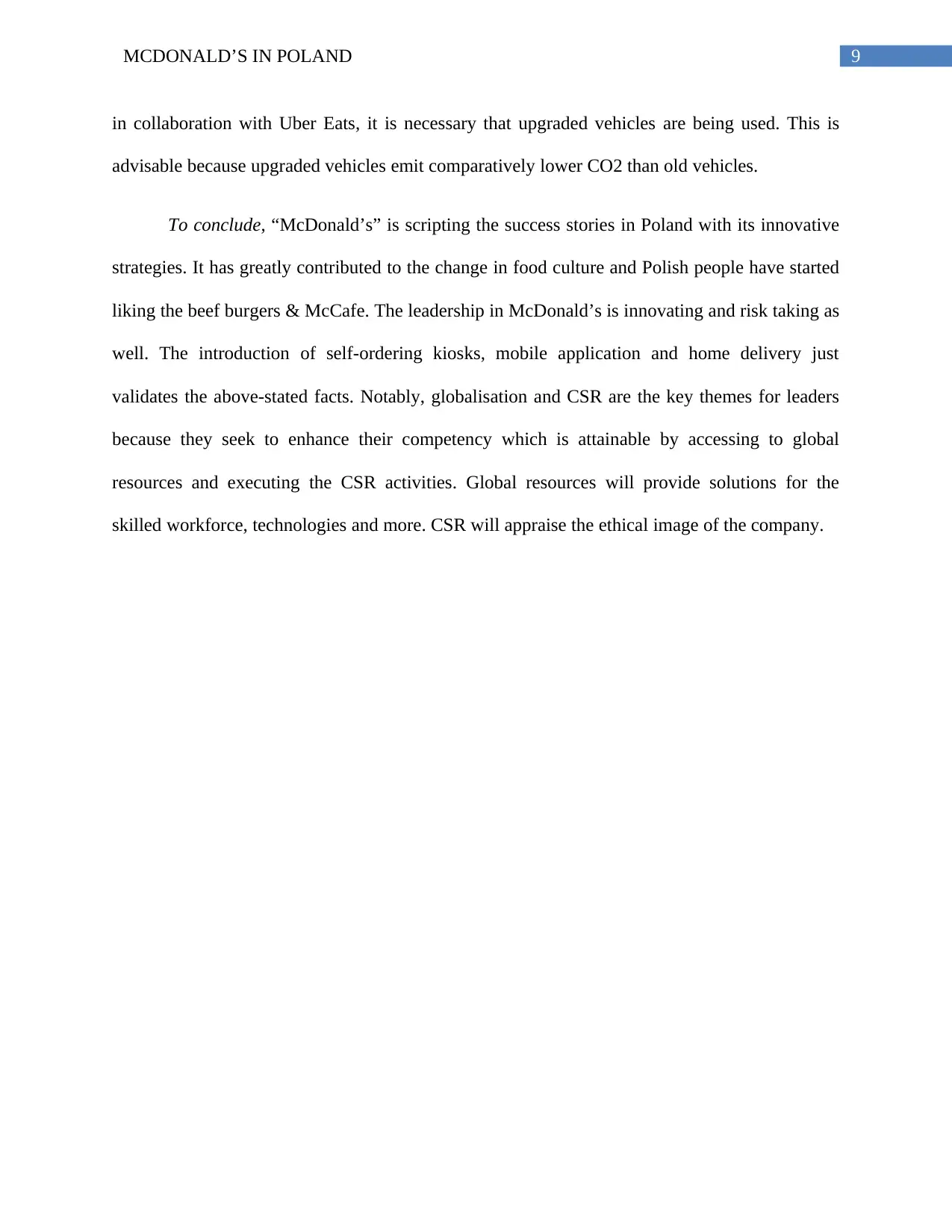
9MCDONALD’S IN POLAND
in collaboration with Uber Eats, it is necessary that upgraded vehicles are being used. This is
advisable because upgraded vehicles emit comparatively lower CO2 than old vehicles.
To conclude, “McDonald’s” is scripting the success stories in Poland with its innovative
strategies. It has greatly contributed to the change in food culture and Polish people have started
liking the beef burgers & McCafe. The leadership in McDonald’s is innovating and risk taking as
well. The introduction of self-ordering kiosks, mobile application and home delivery just
validates the above-stated facts. Notably, globalisation and CSR are the key themes for leaders
because they seek to enhance their competency which is attainable by accessing to global
resources and executing the CSR activities. Global resources will provide solutions for the
skilled workforce, technologies and more. CSR will appraise the ethical image of the company.
in collaboration with Uber Eats, it is necessary that upgraded vehicles are being used. This is
advisable because upgraded vehicles emit comparatively lower CO2 than old vehicles.
To conclude, “McDonald’s” is scripting the success stories in Poland with its innovative
strategies. It has greatly contributed to the change in food culture and Polish people have started
liking the beef burgers & McCafe. The leadership in McDonald’s is innovating and risk taking as
well. The introduction of self-ordering kiosks, mobile application and home delivery just
validates the above-stated facts. Notably, globalisation and CSR are the key themes for leaders
because they seek to enhance their competency which is attainable by accessing to global
resources and executing the CSR activities. Global resources will provide solutions for the
skilled workforce, technologies and more. CSR will appraise the ethical image of the company.
Paraphrase This Document
Need a fresh take? Get an instant paraphrase of this document with our AI Paraphraser
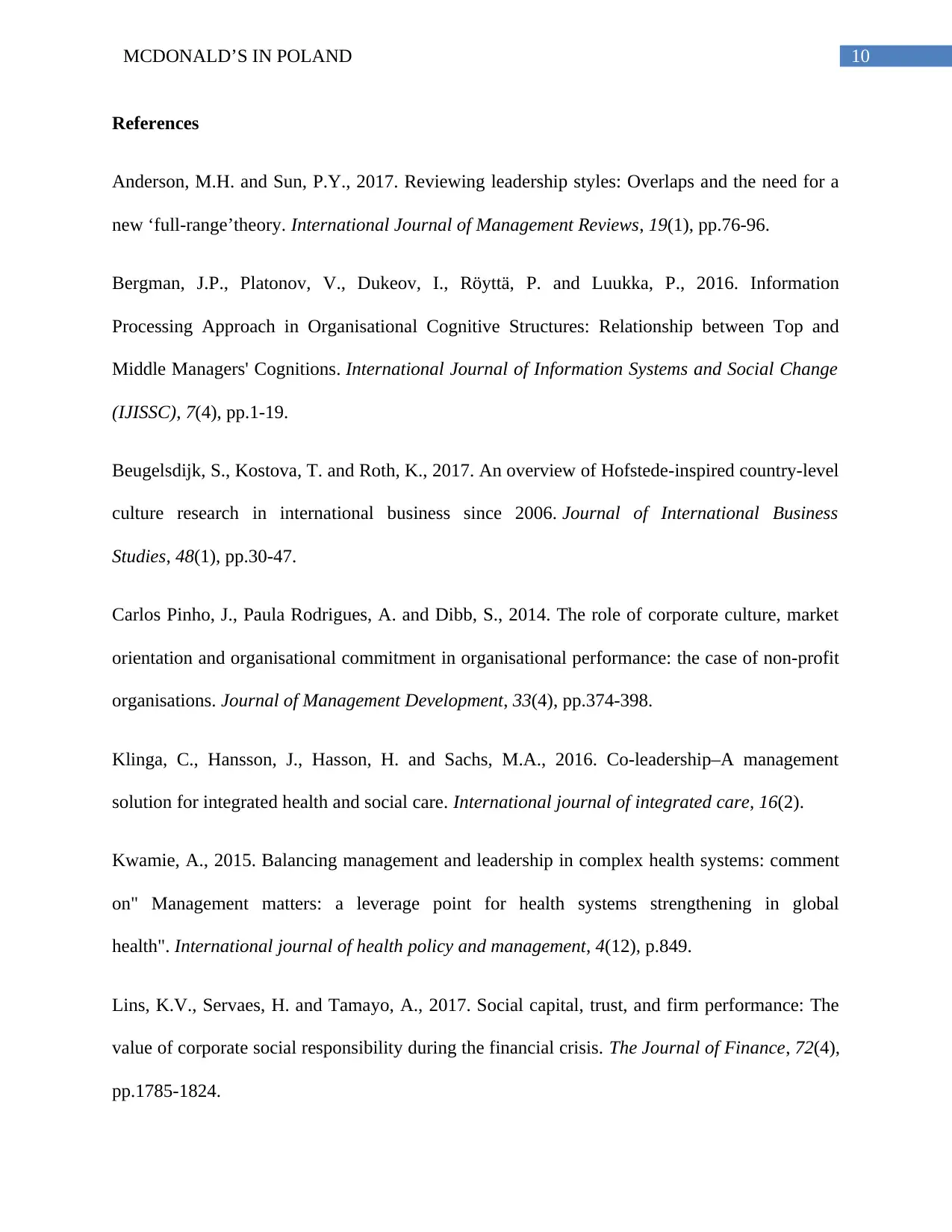
10MCDONALD’S IN POLAND
References
Anderson, M.H. and Sun, P.Y., 2017. Reviewing leadership styles: Overlaps and the need for a
new ‘full‐range’theory. International Journal of Management Reviews, 19(1), pp.76-96.
Bergman, J.P., Platonov, V., Dukeov, I., Röyttä, P. and Luukka, P., 2016. Information
Processing Approach in Organisational Cognitive Structures: Relationship between Top and
Middle Managers' Cognitions. International Journal of Information Systems and Social Change
(IJISSC), 7(4), pp.1-19.
Beugelsdijk, S., Kostova, T. and Roth, K., 2017. An overview of Hofstede-inspired country-level
culture research in international business since 2006. Journal of International Business
Studies, 48(1), pp.30-47.
Carlos Pinho, J., Paula Rodrigues, A. and Dibb, S., 2014. The role of corporate culture, market
orientation and organisational commitment in organisational performance: the case of non-profit
organisations. Journal of Management Development, 33(4), pp.374-398.
Klinga, C., Hansson, J., Hasson, H. and Sachs, M.A., 2016. Co-leadership–A management
solution for integrated health and social care. International journal of integrated care, 16(2).
Kwamie, A., 2015. Balancing management and leadership in complex health systems: comment
on" Management matters: a leverage point for health systems strengthening in global
health". International journal of health policy and management, 4(12), p.849.
Lins, K.V., Servaes, H. and Tamayo, A., 2017. Social capital, trust, and firm performance: The
value of corporate social responsibility during the financial crisis. The Journal of Finance, 72(4),
pp.1785-1824.
References
Anderson, M.H. and Sun, P.Y., 2017. Reviewing leadership styles: Overlaps and the need for a
new ‘full‐range’theory. International Journal of Management Reviews, 19(1), pp.76-96.
Bergman, J.P., Platonov, V., Dukeov, I., Röyttä, P. and Luukka, P., 2016. Information
Processing Approach in Organisational Cognitive Structures: Relationship between Top and
Middle Managers' Cognitions. International Journal of Information Systems and Social Change
(IJISSC), 7(4), pp.1-19.
Beugelsdijk, S., Kostova, T. and Roth, K., 2017. An overview of Hofstede-inspired country-level
culture research in international business since 2006. Journal of International Business
Studies, 48(1), pp.30-47.
Carlos Pinho, J., Paula Rodrigues, A. and Dibb, S., 2014. The role of corporate culture, market
orientation and organisational commitment in organisational performance: the case of non-profit
organisations. Journal of Management Development, 33(4), pp.374-398.
Klinga, C., Hansson, J., Hasson, H. and Sachs, M.A., 2016. Co-leadership–A management
solution for integrated health and social care. International journal of integrated care, 16(2).
Kwamie, A., 2015. Balancing management and leadership in complex health systems: comment
on" Management matters: a leverage point for health systems strengthening in global
health". International journal of health policy and management, 4(12), p.849.
Lins, K.V., Servaes, H. and Tamayo, A., 2017. Social capital, trust, and firm performance: The
value of corporate social responsibility during the financial crisis. The Journal of Finance, 72(4),
pp.1785-1824.
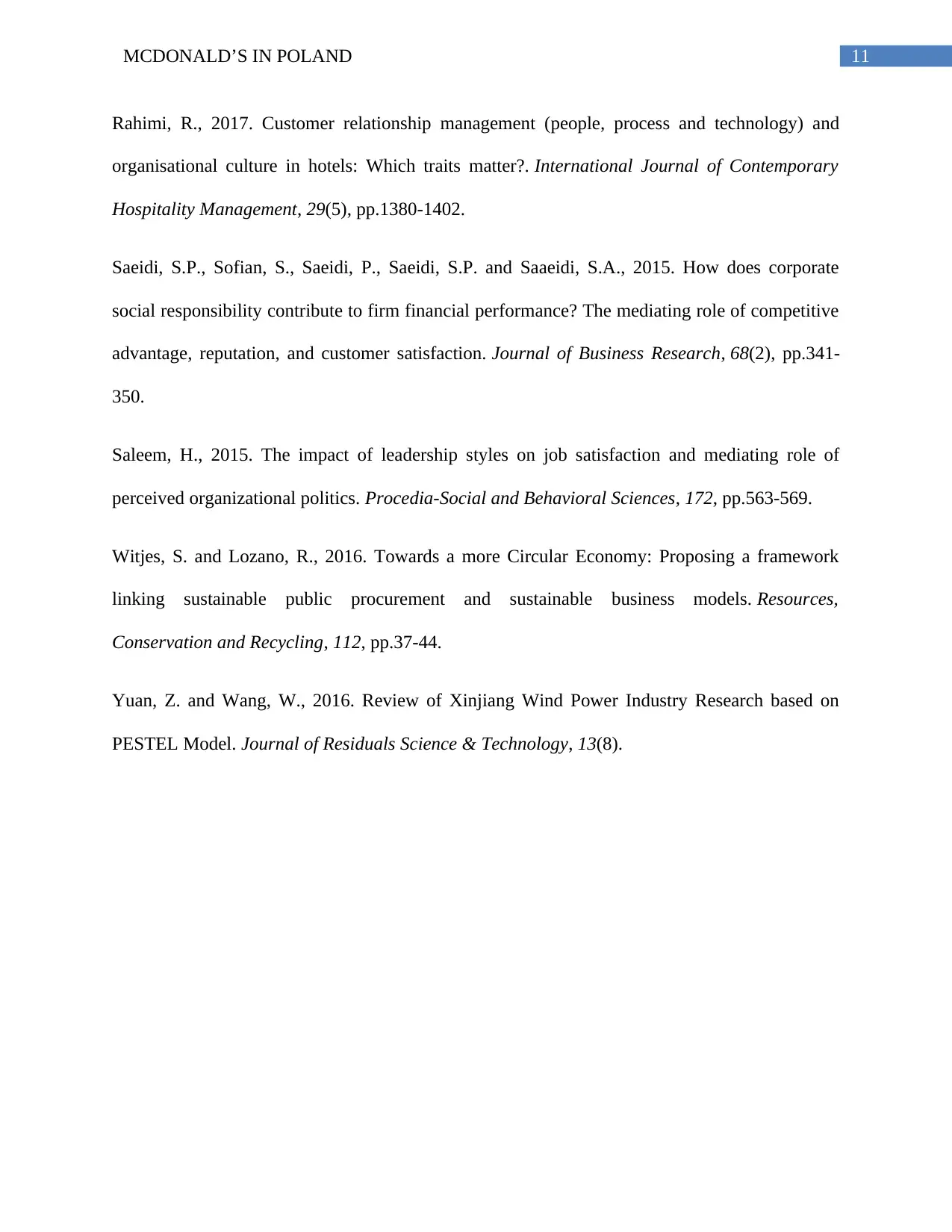
11MCDONALD’S IN POLAND
Rahimi, R., 2017. Customer relationship management (people, process and technology) and
organisational culture in hotels: Which traits matter?. International Journal of Contemporary
Hospitality Management, 29(5), pp.1380-1402.
Saeidi, S.P., Sofian, S., Saeidi, P., Saeidi, S.P. and Saaeidi, S.A., 2015. How does corporate
social responsibility contribute to firm financial performance? The mediating role of competitive
advantage, reputation, and customer satisfaction. Journal of Business Research, 68(2), pp.341-
350.
Saleem, H., 2015. The impact of leadership styles on job satisfaction and mediating role of
perceived organizational politics. Procedia-Social and Behavioral Sciences, 172, pp.563-569.
Witjes, S. and Lozano, R., 2016. Towards a more Circular Economy: Proposing a framework
linking sustainable public procurement and sustainable business models. Resources,
Conservation and Recycling, 112, pp.37-44.
Yuan, Z. and Wang, W., 2016. Review of Xinjiang Wind Power Industry Research based on
PESTEL Model. Journal of Residuals Science & Technology, 13(8).
Rahimi, R., 2017. Customer relationship management (people, process and technology) and
organisational culture in hotels: Which traits matter?. International Journal of Contemporary
Hospitality Management, 29(5), pp.1380-1402.
Saeidi, S.P., Sofian, S., Saeidi, P., Saeidi, S.P. and Saaeidi, S.A., 2015. How does corporate
social responsibility contribute to firm financial performance? The mediating role of competitive
advantage, reputation, and customer satisfaction. Journal of Business Research, 68(2), pp.341-
350.
Saleem, H., 2015. The impact of leadership styles on job satisfaction and mediating role of
perceived organizational politics. Procedia-Social and Behavioral Sciences, 172, pp.563-569.
Witjes, S. and Lozano, R., 2016. Towards a more Circular Economy: Proposing a framework
linking sustainable public procurement and sustainable business models. Resources,
Conservation and Recycling, 112, pp.37-44.
Yuan, Z. and Wang, W., 2016. Review of Xinjiang Wind Power Industry Research based on
PESTEL Model. Journal of Residuals Science & Technology, 13(8).
⊘ This is a preview!⊘
Do you want full access?
Subscribe today to unlock all pages.

Trusted by 1+ million students worldwide
1 out of 12
Related Documents
Your All-in-One AI-Powered Toolkit for Academic Success.
+13062052269
info@desklib.com
Available 24*7 on WhatsApp / Email
![[object Object]](/_next/static/media/star-bottom.7253800d.svg)
Unlock your academic potential
Copyright © 2020–2026 A2Z Services. All Rights Reserved. Developed and managed by ZUCOL.




